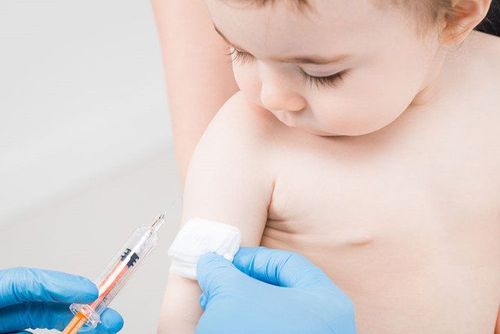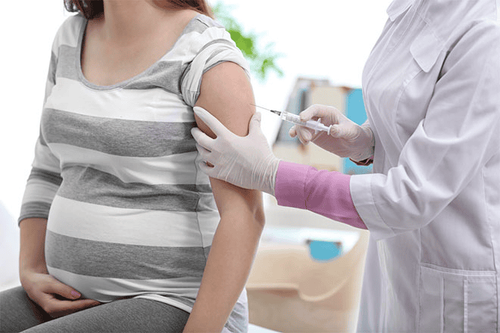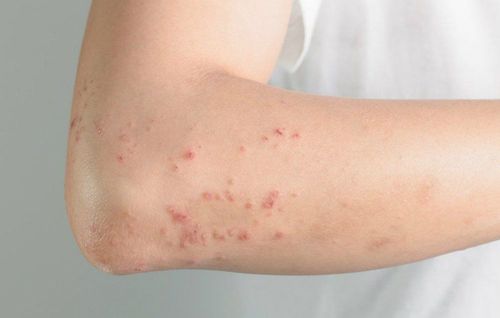This is an automatically translated article.
The vaccines in the 4- to 6-year-old preschool immunization schedule below are recommended by the Centers for Disease Control and Prevention (CDC). Depending on the specific case, the doctor will advise on the type of vaccine and when to give the appropriate vaccine to the child.1. Diphtheria and tetanus pertussis vaccine
Time of injection: when children are 2 months, 4 months old, 6 months old, 15-18 months old, 4-6 years old, 11-12 years old.
Why should diphtheria and tetanus vaccine be given?
Protect children against diseases 03 dangerous diseases for children including diphtheria , tetanus and pertussis . Preventing a child from developing a thick coating on the back of his nose or throat caused by diphtheria that may make it difficult for him or her to breathe or swallow. Protect your child from muscle stiffness caused by tetanus. Helps prevent children from having a severe cough caused by pertussis. Due to the prevention of the above diseases, children do not have to miss school and you do not have to take time off work to take care of them.
2. Polio vaccine

Tiêm vắc xin bại liệt khi trẻ 2 tháng tuổi, 4 tháng tuổi, 6-18 tháng tuổi và 4-6 tuổi
Vaccination schedule: when children are 2 months old, 4 months old, 6-18 months old and 4-6 years old
Why should polio vaccine be given?
Polio is an acute infectious disease caused by the polio virus. When the polio virus enters the body and spreads to the lymph nodes, others enter the central nervous system, causing damage to the anterior horn cells of the spinal cord and the motor neurons of the cerebral cortex. Children with the disease can lead to death or leave irreversible paralysis and lifelong disability. Due to the prevention of the above disease, children do not have to miss school and you do not have to take time off work to take care of them.
3. Measles mumps rubella vaccine
Vaccination schedule: when children are 12-15 months old and 4-6 years old
Why should the measles, mumps, and rubella vaccine be given?
Protect your baby from measles, mumps and rubella, all of which can cause dangerous complications for both mother and baby. Protect your child from the nasty rash and high fever caused by measles. Protect your child from fever and swollen glands under the ears or jaw from mumps. Prevent babies from transmitting rubella virus to pregnant women, because pregnant women who contract rubella in the first 3 months of pregnancy will be prone to complications such as miscarriage, stillbirth or birth defects for the fetus such as: heart defects, cataracts, congenital deafness, mental retardation... Due to the prevention of the above diseases, children do not have to miss school and you do not have to take time off work to take care of them.
4. Chickenpox vaccine
Time of injection: when the child is 1 year old to 15 months old and 4-6 years old.
Why should chickenpox vaccine?
Chickenpox is caused by the varicella zoster virus, the disease is common in the spring and is very easily transmitted through respiratory droplets and contact with secretions of infected people. The disease mainly affects children, especially those of kindergarten and preschool age, with a very high risk of spreading. Complications of chickenpox can cause ear infections (outer ear, middle ear), laryngitis, pneumonia. Some severe cases can cause acute nephritis, very dangerous encephalitis - meningoencephalitis, which can lead to death if detected late and not treated promptly. Due to the prevention of the above disease, children do not have to miss school and you do not have to take time off work to take care of them.
5. Flu vaccine

Cần tiêm vắc xin cúm hằng năm
Vaccination schedule: it is recommended that parents know the vaccination schedule for 4-year-old children and the immunization schedule for 6-year-old children who need annual flu vaccination because children at this age are starting school but they do not have enough immunity before going to school, frequent contact in crowded environments and risk of infection from other children when playing together. In particular, viral flu is common among children during the back-to-school season, so as long as one child in the class gets sick, it can spread to the whole class.
Why should you get the flu vaccine?
Reduces the risk of getting the flu and reduces the chance of your child being hospitalized. Reducing the risk of serious complications from the flu especially if your child is under 5 years old, such as pharyngitis, laryngitis, bronchitis, pneumonia, onset of an asthma attack or otitis media, myocarditis, pericarditis and especially with high mortality in children with chronic diseases. Reduce the risk of illness, children don't have to miss school or you don't have to take time off work to take care of them. Help prevent the spread of flu to family and friends, especially those with weakened immune systems such as infants under 6 months of age and people with weakened immune systems. Vinmec International General Hospital uses a source of high-quality vaccines, of clear origin, suitable for the age to be vaccinated, ensuring safety from the check-in, storage to use. Before vaccination, all customers are screened before vaccination with specialist doctors to ensure the best health when vaccinated. 100% of vaccinated customers are monitored and re-evaluated before leaving. In particular, the post-vaccination monitoring room is fully equipped with emergency facilities; the team of doctors - nurses are trained in anaphylaxis emergency management to ensure timely and correct treatment when an incident occurs.
For direct advice or to schedule an appointment for vaccination at Vinmec International General Hospital, you can contact Vinmec Health System nationwide, or register online HERE
References: Cdc.gov
See more
Vaccines for 6-month-old babies Vaccines for 7-11 month old babies Vaccines for 11-12 year olds as recommended by CDC (USA)













